Moishe House is the global leader in creating meaningful Jewish experiences for young adults in their 20s and early 30s, and now provides 10,000 programs annually, engaging more than 50,000 unique young adults (with more than 200,000 in total attendance each year). This evaluation is a follow-up to studies conducted in 2011 and 2015. It assesses the ongoing impact of the Moishe House model, with an emphasis on examining the newer Moishe House Without Walls (MHWOW) program. Evaluation findings presented in this executive summary are drawn from a survey conducted in late 2017 through early 2018, modified from the previous evaluation survey, as well as from program tracking data.
Key Findings:
- As Moishe House expands its reach and offerings (by 150% since 2011), it continues to yield a high impact, deepening participants’ connection to Judaism, Jewish community, and Jewish life. Moishe House helps young adults become stronger leaders in the Jewish community.
- As Moishe House continues to grow, it may be gradually attracting a growing proportion of participants with more nominal Jewish backgrounds.
- Beyond Moishe House’s house-based programs, MHWOW is a strategic way to engage young Jewish adults in Jewish experiences that are meaningful to them.Moishe House leaves a lasting impact on hosts, residents, and participants alike.
- Over time, people maintain their feelings of connection, continue their engagement in Jewish life, and retain knowledge and confidence in leading certain aspects of Jewish life.
Moishe House: 2018 Evaluation Findings, May 2018, Informing Change
Executive Summary
The four-year, nine-million-dollar New York Teen Initiative is a jointly funded investment of the UJA-Federation of New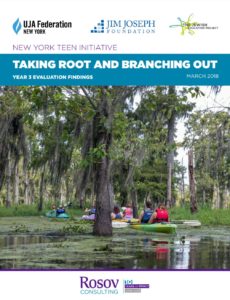 York and the Jim Joseph Foundation. With The Jewish Education Project serving as lead operator, the Initiative seeks to redesign and redefine the area’s Jewish teen engagement through the creation of compelling summer experiences. The Initiative builds on UJA Federation of New York’s historic and current efforts to support programs that attract teenagers to Jewish life and experiences. The Initiative is part of a national effort — spearheaded by the Jim Joseph Foundation — in which 14 foundations and federations are working together as a “Funder Collaborative” to expand and deepen Jewish teen education and engagement in 10 communities across the United States.
York and the Jim Joseph Foundation. With The Jewish Education Project serving as lead operator, the Initiative seeks to redesign and redefine the area’s Jewish teen engagement through the creation of compelling summer experiences. The Initiative builds on UJA Federation of New York’s historic and current efforts to support programs that attract teenagers to Jewish life and experiences. The Initiative is part of a national effort — spearheaded by the Jim Joseph Foundation — in which 14 foundations and federations are working together as a “Funder Collaborative” to expand and deepen Jewish teen education and engagement in 10 communities across the United States.
Conceived as an effort that would set in motion a long-term sea change in Jewish teen programming, the NYTI includes three main components:
1. Incubation of new programmatic models for Jewish teen summer experiences, including local New York area programs, domestic travel in the United States, and Israel travel.
2. Comprehensive marketing to increase awareness of new and existing summer opportunities.
3. Scholarship programs to help make new and existing summer experiences more affordable for teens’ families.
New York Teen Initiative: Taking Root and Branching Out, Year 3 Evaluation Findings, March 2018
The Denver Boulder Jewish Teen Education and Engagement Initiative (the Initiative) began in 2014 with a partnership between Rose 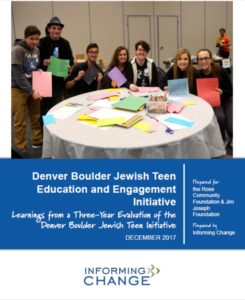 Community Foundation and Jim Joseph Foundation. The Initiative was conceived in response to research and a community engagement process done in 2010 by Rose Community Foundation’s Jewish Life Committee and the Allied Jewish Federation (now JEWISHcolorado) about engaging Jewish teens in greater Denver and Boulder.
Community Foundation and Jim Joseph Foundation. The Initiative was conceived in response to research and a community engagement process done in 2010 by Rose Community Foundation’s Jewish Life Committee and the Allied Jewish Federation (now JEWISHcolorado) about engaging Jewish teens in greater Denver and Boulder.
The desired ultimate impact from this Initiative is that throughout their lives, every teen in the Denver and Boulder Jewish communities can answer the question, “How can my Judaism inform, inspire, and advance the good I seek to do in the world?” To accomplish this, the four-year Initiative (2014–18) was created with three initial objectives in mind, and with an undercurrent of innovation running through its activities. The three objectives are:
1. Increase funding to existing innovators and new projects as a means to provide higher quality experiences and achieve incremental growth in teen participation.
2. Increase the number and quality of Jewish professionals and trained volunteers working with Jewish teens.
3. Promote youth-initiatives and youth-led ideas that engage teens and their peers in Jewish life.
The Initiative funders partnered with Informing Change to evaluate the Initiative over the first three years of its four-year lifespan.
Expanding Innovative Opportunities for Jewish Teens: Learnings from a Three-Year Evaluation of the Denver Boulder Jewish Teen Education and Engagement Initiative, March 2018, Executive Summary, Full Report
Preschool is an extraordinary time of connectedness and openness for children as well as parents. At no other time will parents be so 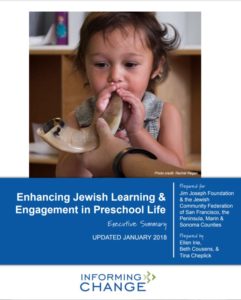 involved—so literally present—in their children’s schooling. During the early childhood years, parents reshape the way they spend their time, who they spend it with, and who they turn to as advisors. Children are also eager to learn and are developing socio-emotionally, cognitively, and spiritually.
involved—so literally present—in their children’s schooling. During the early childhood years, parents reshape the way they spend their time, who they spend it with, and who they turn to as advisors. Children are also eager to learn and are developing socio-emotionally, cognitively, and spiritually.
To take advantage of this time in families’ lives, in 2011 the Early Childhood Family Engagement Initiative (ECFEI) of the Jewish Community Federation and Endowment Fund of San Francisco, the Peninsula, Marin and Sonoma Counties, with significant support from the Jim Joseph Foundation, launched the Jewish Resource Specialist (JRS) Initiative. The JRS Initiative is intended to make the early childhood years a true gateway into Jewish life for children and their families. With ongoing coaching, mentoring, and supports from the JRS faculty at ECFEI, a teacher or other staff member is designated to spend 10 hours per week as a preschool’s JRS educator. In this role they are tasked with deepening Jewish learning at the preschool and increasing family engagement in Jewish life more generally. The JRS Initiative is designed to help Jewish early childhood education (ECE) programs realize their commitment to build a Jewish experience and environment for children and families.
The JRS Initiative also addresses the dearth of leaders working to build the field of Jewish ECE. Those who want to focus on Jewish ECE and build communities of engaged Jewish families with preschool-aged children are challenged to find the support, mentors, and professional development opportunities they need to craft a career path. The JRS Initiative seeks to meet these field-wide demands by developing the skills and Jewish knowledge of small cohorts of JRS educators who then bring ideas and guidance to their schools.
The JRS model has demonstrated, over two cohorts of ECE programs, that it can effectively address these needs during a three-year cycle of grant funding, educational curricula, and corollary supports. Evidence from an evaluation of the JRS pilot and subsequent data collected in 2017 provide evidence of lasting change.
Enhancing Jewish Learning & Engagement in Preschool Life (Executive Summary), January 2018
Enhancing Jewish Learning & Engagement in Preschool Life (Executive Summary and Full Report), January 2018
Onboarding new staff can set the tone for a professional relationship. Dive into some of the best practices from Leading Edge that enable employees to thrive from Day 1.
from Day 1.
Onboarding Best Practices: A Guide for Onboarding New Staff
The Jewish Outdoor, Food, Farming, and Environmental Education (JOFEE) Fellowship began in 2015 with the goal of placing three cohorts of Fellows at host institutions nationwide. To date, the Fellowship is halfway to this goal—the 17 Fellows of the first cohort have fully completed their Fellowship, and the 18 Fellows of the second cohort are well under way with theirs. Through the JOFEE Fellowship, Hazon, which designed and is implementing the Fellowship, and the Jim Joseph Foundation, which is funding the Fellowship, aim to:
1. Develop a training program that integrates Jewish and JOFEE learning and develops the Fellows as JOFEE educators;
2. Implement JOFEE programs across host institutions to help them sustain and invest in JOFEE programming; and
3. Create partnerships and resources for the JOFEE world.
The main focus of the Fellows’ work is to design and implement JOFEE programming at their placements. To support them, Fellows also receive training throughout the Fellowship, along with mentorship from a seasoned JOFEE professional.
JOFEE as a field is a relatively new concept for those involved in Jewish education. However, as revealed in research conducted in 2014 for the Seeds of Opportunity report—which evaluated the state of JOFEE overall—it is a powerful tool for targeting and engaging members of the Jewish community, particularly younger members. The Fellowship is a direct offshoot of the 2014 report, created with the primary goal to build the capacity of JOFEE educators, leading to a broader, more robust field.
The Jim Joseph Foundation and Hazon engaged Informing Change to conduct a four-year evaluation of the Fellowship. Rooted in the expected outcomes for the JOFEE Fellowship, this evaluation is designed to examine the components of the Fellowship within the framework of five evaluation questions.
Learnings from the JOFEE Fellowship, Year 2 Evaluation Report, September 2017
The Los Angeles Jewish Teen Initiative (LAJTI or the Initiative), through a funding partnership between the Jewish Federation of Greater 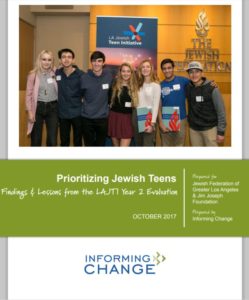 Los Angeles (the Federation) and the Jim Joseph Foundation (the funders), launched in 2015 and just completed its second year of implementation. To achieve the ultimate goal of engaging Jewish teens in Los Angeles in activities that promote a healthy, personally meaningful, and fulfilled Jewish life, LAJTI has three main strategies:
Los Angeles (the Federation) and the Jim Joseph Foundation (the funders), launched in 2015 and just completed its second year of implementation. To achieve the ultimate goal of engaging Jewish teens in Los Angeles in activities that promote a healthy, personally meaningful, and fulfilled Jewish life, LAJTI has three main strategies:
1. Expand and create teen engagement programs of excellence.
2. Nurture the teen ecosystem and build community commitment to teen engagement.
3. Support the professional development of educators of Jewish teens.
LAJTI seeks to create ripple effects throughout the community—including the teens who attend programs, their parents, program staff and leaders who design and deliver teen-focused programming, and community leaders and funders who champion and support the work.
The funders have partnered with Informing Change to evaluate LAJTI over its first three years. After completing the Year 1 evaluation report, which provided a baseline assessment of LAJTI, Informing Change collaborated with LAJTI staff and funders to develop seven evaluation questions to explore specifically in Year 2. LAJTI leaders wanted to understand certain phenomena in this second year of implementation that would inform the Initiative’s further development, while also retaining some of the original evaluation questions. This change also necessitated a shift in some of the data collection methods.
Prioritizing Jewish Teens: Findings & Lessons from the LAJTI Year 2 Evaluation, October 2017
Expanding the Circle of Teen Education & Engagement: Evaluation of Year 1 of the Los Angeles Jewish Teen Initiative, December 2016
Learn more: A Taste of the Real World: Lessons Learned from a Community Internship Program for Teens
With a $10.2 million combined investment from the AVI CHAI Foundation and the Jim Joseph Foundation (the funders), the Foundation for Jewish Camp (FJC) incubated four new Jewish specialty camps from October 2012 through November 2016, turning ideas into actual, functioning camps.
The fun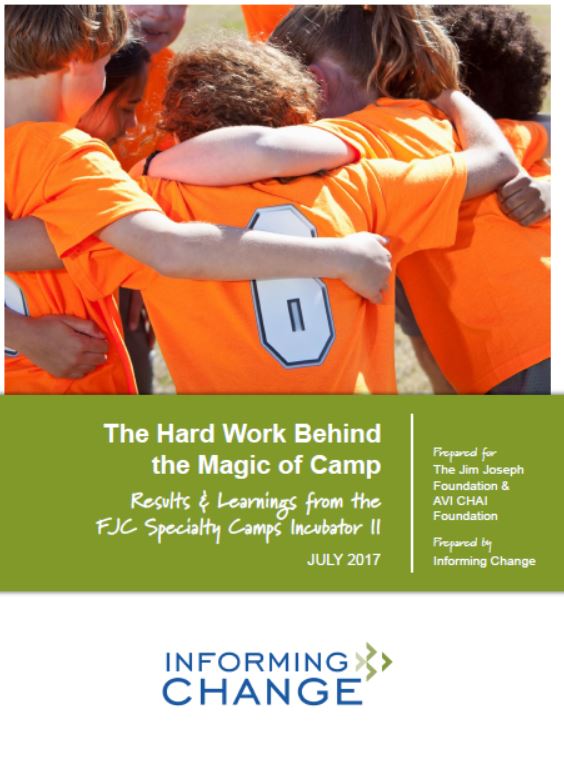 ders engaged Informing Change in October 2012 to design and implement a five-year evaluation of this second cohort of FJC’s Specialty Camps Incubator (the Incubator). Informing Change evaluated the extent to which the new camps developed the capacities needed to run strong summer programs, deliver intended camper outcomes, become sustainable nonprofit entities, and expand the number of Jewish youth attending camp. The evaluation findings are based on surveys from campers and parents, as well as interviews, site visits, observations, and materials reviews.
ders engaged Informing Change in October 2012 to design and implement a five-year evaluation of this second cohort of FJC’s Specialty Camps Incubator (the Incubator). Informing Change evaluated the extent to which the new camps developed the capacities needed to run strong summer programs, deliver intended camper outcomes, become sustainable nonprofit entities, and expand the number of Jewish youth attending camp. The evaluation findings are based on surveys from campers and parents, as well as interviews, site visits, observations, and materials reviews.
The Hard Work Behind the Magic of Camp: Results & Learnings from the FJC Specialty Camps Incubator II, Informing Change, August 2017
Executive Summary
Full Report
The purpose of this qualitative research project was to understand the Moishe House Peer-Led Retreat Program and to gain insight intofurther improvements to be made to the existing model. The Peer-Led Retreat Program currently recruits and equips Jewish young adults with the skills to lead a weekend Jewish retreat for a group of their peers. Data for this research were gathered during the 2016 calendar year through review of nine responses to a written feedback survey designed and administered by Moishe House, and through phone interviews conducted by the Jim Joseph Foundation with five retreat facilitators and two retreat participants. The common themes that emerged were used to organize and frame the insights, recommendations, and questions below.
Moishe House Peer-Led Retreats – Interview Highlights and Insights, August 2017
The four-year, nine million dollar New York Teen Initiative is a jointly funded investment of the UJA-Federation of New York and the Jim Joseph Foundation. With The Jewish Education Project serving as lead operator, the Initiative seeks to redesign and redefine the area’s Jewish teen engagement through the creation of compelling summer experiences. The Initiative builds on UJA-Federation of New York’s historic and current efforts to support programs that attract teenagers to Jewish life and experiences. The Initiative is part of a national effort —spearheaded by the Jim Joseph Foundation — in which 14 foundations and federations are working together as a “Funder Collaborative” to expand and deepen Jewish teen education and engagement in 10 communities across the United States.
In Year 2 of the Initiative, the evaluation was focused on four sets of concerns and associated questions: Program Implementation; Expanded Reach to Teens; Participant Outcomes; and Tracking Year 1 Participants.
New York Teen Initiative and New York Incubator of Intensive Summer Experiences for Jewish Teens: “That was the most myself I have ever been,” Year 2 Evaluation Findings, February 2017
The formation of the Jewish Teen Education and Engagement Funder Collaborative was the result of a process begun by the Jim Joseph Foundation in 2013. At that time, in an effort to spawn innovative, locally sustainable teen engagement programs, the Jim Joseph Foundation brought together an array of funders to explore various approaches. The first 24 months of this deliberate process in which ten local and five national funders undertook to educate themselves, build relationships and co-invest in community-based Jewish teen education and engagement initiatives was thoughtfully documented in a case study issued in January 2015 by Informing Change, entitled, Finding New Paths for Teen Engagement and Learning: A Funder Collaborative Leads the Way.
This case study documents the next stage of the Funder Collaborative’s development, roughly the 21-month period from January 2015 through October 2016 and reflects the Collaborative’s commitment to share its process with others who may choose to embark on their own co-funding endeavor. The case study explores the Collaborative’s experience as it deepens its work in the realm of Action and slowly considers how to move toward Impact.
PREPARING TO DEEPEN ACTION: A Funder Collaborative Finds its Way, June 2017
The formation of the Jewish Teen Education and Engagement Funder Collaborative began in 2013, when more than a dozen local and national funders of Jewish teen programming were brought together by the Jim Joseph Foundation for an ongoing series of discussions about expanding teen involvement in Jewish life. Over the next two years, this group developed into a more formal Funder Collaborative, with the expressed aim of making grants to support comprehensive, innovative, and sustainable new community-based initiatives in ten communities across the United States: Atlanta, Baltimore, Boston, Chicago, Cincinnati, Denver, Los Angeles, New York, San Diego, and San Francisco.
In order to understand the process and outcomes of teen programs, both in individual communities and across multiple regions, two concurrent evaluation efforts were undertaken alongside the community initiatives. In each community, local evaluators were contracted to study regional initiatives; and, on a national level, a Cross-Community Evaluation (CCE) was initiated in 2015.
The CCE is designed to answer a set of primary evaluation questions centered on the learning and growth of Jewish teens in different communities, as well as to facilitate and encourage continual communication and sharing of lessons across communities. At its heart is an exploration into how, and to what extent, local initiatives are successfully engaging teens in Jewish learning and growth.
INITIAL OUTCOMES ACROSS COMMUNITIES: First Fruits from the Jewish Teen Education and Engagement Funder Collaborative, June 2017
 York and the Jim Joseph Foundation. With The Jewish Education Project serving as lead operator, the Initiative seeks to redesign and redefine the area’s Jewish teen engagement through the creation of compelling summer experiences. The Initiative builds on UJA Federation of New York’s historic and current efforts to support programs that attract teenagers to Jewish life and experiences. The Initiative is part of a national effort — spearheaded by the Jim Joseph Foundation — in which 14 foundations and federations are working together as a “Funder Collaborative” to expand and deepen Jewish teen education and engagement in 10 communities across the United States.
York and the Jim Joseph Foundation. With The Jewish Education Project serving as lead operator, the Initiative seeks to redesign and redefine the area’s Jewish teen engagement through the creation of compelling summer experiences. The Initiative builds on UJA Federation of New York’s historic and current efforts to support programs that attract teenagers to Jewish life and experiences. The Initiative is part of a national effort — spearheaded by the Jim Joseph Foundation — in which 14 foundations and federations are working together as a “Funder Collaborative” to expand and deepen Jewish teen education and engagement in 10 communities across the United States. Community Foundation and Jim Joseph Foundation. The Initiative was conceived in response to research and a community engagement process done in 2010 by Rose Community Foundation’s Jewish Life Committee and the Allied Jewish Federation (now JEWISHcolorado) about engaging Jewish teens in greater Denver and Boulder.
Community Foundation and Jim Joseph Foundation. The Initiative was conceived in response to research and a community engagement process done in 2010 by Rose Community Foundation’s Jewish Life Committee and the Allied Jewish Federation (now JEWISHcolorado) about engaging Jewish teens in greater Denver and Boulder. involved—so literally present—in their children’s schooling. During the early childhood years, parents reshape the way they spend their time, who they spend it with, and who they turn to as advisors. Children are also eager to learn and are developing socio-emotionally, cognitively, and spiritually.
involved—so literally present—in their children’s schooling. During the early childhood years, parents reshape the way they spend their time, who they spend it with, and who they turn to as advisors. Children are also eager to learn and are developing socio-emotionally, cognitively, and spiritually.
 Los Angeles (the Federation) and the Jim Joseph Foundation (the funders), launched in 2015 and just completed its second year of implementation. To achieve the ultimate goal of engaging Jewish teens in Los Angeles in activities that promote a healthy, personally meaningful, and fulfilled Jewish life, LAJTI has three main strategies:
Los Angeles (the Federation) and the Jim Joseph Foundation (the funders), launched in 2015 and just completed its second year of implementation. To achieve the ultimate goal of engaging Jewish teens in Los Angeles in activities that promote a healthy, personally meaningful, and fulfilled Jewish life, LAJTI has three main strategies: ders engaged Informing Change in October 2012 to design and implement a five-year evaluation of this second cohort of FJC’s Specialty Camps Incubator (the Incubator). Informing Change evaluated the extent to which the new camps developed the capacities needed to run strong summer programs, deliver intended camper outcomes, become sustainable nonprofit entities, and expand the number of Jewish youth attending camp. The evaluation findings are based on surveys from campers and parents, as well as interviews, site visits, observations, and materials reviews.
ders engaged Informing Change in October 2012 to design and implement a five-year evaluation of this second cohort of FJC’s Specialty Camps Incubator (the Incubator). Informing Change evaluated the extent to which the new camps developed the capacities needed to run strong summer programs, deliver intended camper outcomes, become sustainable nonprofit entities, and expand the number of Jewish youth attending camp. The evaluation findings are based on surveys from campers and parents, as well as interviews, site visits, observations, and materials reviews.